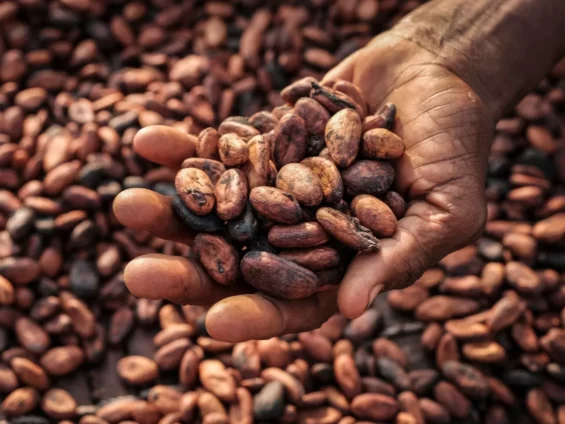The Ghana Cocoa Board (COCOBOD) has invested almost a billion cedis last year to rehabilitate aged cocoa farms and those ravaged by swollen shoot diseases to help increase national production in the short to medium term.
The amount adds to similar spending in previous years to replace farms attacked by the virus, leading to reduced cocoa production in recent years.
The Chief Executive Officer of COCOBOD, Joseph Boahen Aidoo, said in an interview that the initiative was part of efforts to sustain cocoa production and the livelihoods of farmers.
He was, therefore, confident that the country would produce more than 800,000 metric tons of cocoa in the 2024/25 season that opens in September.
The CEO and his deputy in charge of Finance and Administration, Ray Ankrah, were reacting to media reports that COCOBOD’s administrative expenses rose to GH¢3.4 billion last year when cocoa production fell.
Mr. Aidoo said the money was used to fund the cutting down of diseased and aged farms, nurse, and plant seedlings as well as maintain the rehabilitated farms before handing them over to farmers across the country.
He said this strategic investment in farmers and farms led to the board’s administrative cost increasing to GH¢3.4 billion in 2023.
Therefore, Mr Aidoo said it was misleading for people to suggest that COCOBOD spent GH¢3.4 billion at its head office last year when a chunk of the funds was used to support cocoa production and the welfare of the crop farmers.
Finance angle
The Deputy CEO in charge of Finance and Administration said the misleading report was in spite of a detailed explanation provided in the board’s audited accounts.
“I think it’s deliberate to cause public disaffection because our audited accounts and the Auditor General’s report as captured in the 2023 financials show clearly that, included in the administrative cost is a GH¢943 million expense incurred on our productivity enhancement programmes (PEPs).”
“The GH¢943 million was actually used to rehabilitate diseased and moribund farms to sustain the livelihood of the affected farmers and increase cocoa production, starting with the 2024/25 season,” Mr Ankrah said.
He explained that but for that one-off expenditure, which he said was funded from a loan secured from the African Development Bank (AfDB), the administrative cost actually reduced in 2023.
Sustaining production
A non-curable disease, the swollen shoot virus disease (CSSVD) reduces yields of cocoa trees before killing them. Data show that a large portion of Ghana’s total cocoa farmlands are either moribund or affected by the disease, partly contributing to reduced production.
COCOBOD’s CEO said people needed to understand that rehabilitation of cocoa farms was a necessity to sustain the sector and the livelihoods of the crop farmers.
He said that but for such a drastic yet visionary effort, the country’s cocoa-productive land area would shrink, leading to reduced yields with all the attendant benefits derived from cocoa.
Mr Aidoo noted that COCOBOD was working tirelessly to revive cocoa production after extreme weather conditions, technically called El Nino effect, affected the country’s cocoa sector, leading to a decline in output.
He said some of the rehabilitated farms would start contributing to national output next season, resulting in increased production.
Inputs
Mr Aidoo assured farmers of an adequate and timely supply of inputs next season to facilitate farmers’ work for increased production.
He said COCOBOD was keen on making it easier and comfortable for farmers to produce cocoa and would, therefore, invest appropriately to reduce the challenges impeding the work.
He mentioned the board’s hand pollination, pruning and irrigation schemes as some of the efforts used to increase production.
He said these measures were also making cocoa farming more attractive to the youth, leading to more young people joining the venture.
Financial turnaround
On his part, COCOBOD’s Deputy CEO in charge of Finance and Administration said beyond working to raise output, the board was putting in place prudent measures to revive its fortunes, which, he said were ravaged by the effects of the COVID-19 pandemic.
He said COCOBOD’s return to profitability last year was clear evidence of that commitment.
The board’s audited accounts and the Auditor General’s 2023 report on public boards and corporations showed that COCOBOD made a GH¢2.3 billion profit last year compared to a GH¢4.2 billion loss in 2022.
The deputy CEO was confident that the turnaround would be sustained and improved to help strengthen COCOBOD’s ability to support farmers and the sector.
In concluding, the CEO assured farmers of better policies and programmes next season in line with the government’s commitment to improving farmers' livelihoods
Latest Stories
-
Queenmother calls on President-elect Mahama to appoint more women in his government
32 seconds -
Atletico Madrid beat Barcelona to go top of La Liga
18 minutes -
Usyk breaks Fury’s heart with points win in rematch
21 minutes -
Ghana-Russia Centre to run Russian language courses in Ghana
6 hours -
The Hidden Costs of Hunger: How food insecurity undermines mental and physical health in the U.S.
6 hours -
18plus4NDC marks 3rd anniversary with victory celebration in Accra
9 hours -
CREMA workshop highlights collaborative efforts to sustain Akata Lagoon
9 hours -
2024/25 Ghana League: Heart of Lions remain top with win over Basake Holy Stars
10 hours -
Black Queens: Nora Hauptle shares cryptic WAFCON preparation message amid future uncertainty
11 hours -
Re-declaration of parliamentary results affront to our democracy – Joyce Bawah
11 hours -
GPL 2024/25: Vision FC score late to deny Young Apostles third home win
11 hours -
Enhancing community initiatives for coastal resilience: Insights from Keta Lagoon Complex Ramsar Site Workshop
11 hours -
Family Health University College earns a Presidential Charter
11 hours -
GPL 2024/25: Bibiani GoldStars beat Nsoatreman to keep title race alive
11 hours -
GPL 2024/25 Bechem United keep title hopes alive with narrow win over FC Samartex
11 hours

